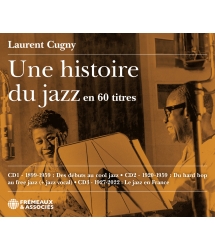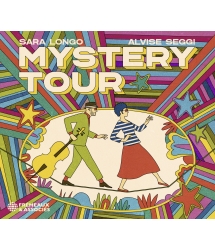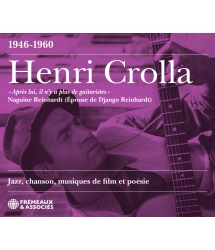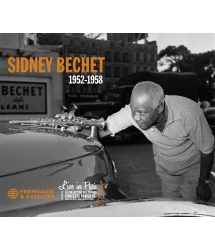- Notre Catalogue
- Philosophie
- Philosophes du XXème siècle et d'aujourd'hui
- Histoire de la philosophie (PUF)
- Contre-Histoire et Brève encyclopédie par Michel Onfray
- L'œuvre philosophique expliquée par Luc Ferry
- La pensée antique
- Les penseurs d'hier vus par les philosophes d'aujourd'hui
- Textes philosophiques historiques interprétés par de grands comédiens
- Histoire
- Livres
- Sciences Humaines
- Paroles historiques
- Livres audio & Littérature
- Notre Catalogue
- Jazz
- Blues - R'n'B - Soul - Gospel
- Rock - Country - Cajun
- Chanson française
- Musiques du monde
- Afrique
- France
- Québec / Canada
- Hawaï
- Antilles
- Caraïbes
- Cuba & Afro-cubain
- Mexique
- Amérique du Sud
- Tango
- Brésil
- Tzigane / Gypsy
- Fado / Portugal
- Flamenco / Espagne
- Yiddish / Israël
- Chine
- Tibet / Népal
- Asie
- Océan indien / Madagascar
- Japon
- Indonésie
- Océanie
- Inde
- Bangladesh
- URSS / Chants communistes
- Musiques du monde / Divers
- Musique classique
- Compositeurs - Musiques de film - B.O.
- Sons de la nature
- Notre Catalogue
- Jeunesse
- Philosophie
- Nouveautés
- Comment commander ?
- Recevoir le catalogue
- Manifeste
- Dictionnaire
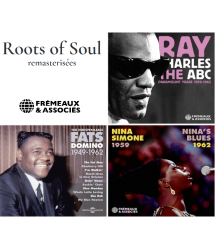

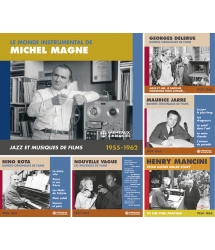








- Notre Catalogue
- Philosophie
- Philosophes du XXème siècle et d'aujourd'hui
- Histoire de la philosophie (PUF)
- Contre-Histoire et Brève encyclopédie par Michel Onfray
- L'œuvre philosophique expliquée par Luc Ferry
- La pensée antique
- Les penseurs d'hier vus par les philosophes d'aujourd'hui
- Textes philosophiques historiques interprétés par de grands comédiens
- Histoire
- Livres
- Sciences Humaines
- Paroles historiques
- Livres audio & Littérature
- Notre Catalogue
- Jazz
- Blues - R'n'B - Soul - Gospel
- Rock - Country - Cajun
- Chanson française
- Musiques du monde
- Afrique
- France
- Québec / Canada
- Hawaï
- Antilles
- Caraïbes
- Cuba & Afro-cubain
- Mexique
- Amérique du Sud
- Tango
- Brésil
- Tzigane / Gypsy
- Fado / Portugal
- Flamenco / Espagne
- Yiddish / Israël
- Chine
- Tibet / Népal
- Asie
- Océan indien / Madagascar
- Japon
- Indonésie
- Océanie
- Inde
- Bangladesh
- URSS / Chants communistes
- Musiques du monde / Divers
- Musique classique
- Compositeurs - Musiques de film - B.O.
- Sons de la nature
- Notre Catalogue
- Jeunesse
- Philosophie
- Nouveautés
- Comment commander ?
- Recevoir le catalogue
- Manifeste
- Dictionnaire
THE DIME NOTES, LONDON
THE DIME NOTES
Ref.: FA8553
Direction Artistique : DAVE KELBIE
Label : Frémeaux & Associés
Durée totale de l'œuvre : 57 minutes
Nbre. CD : 1
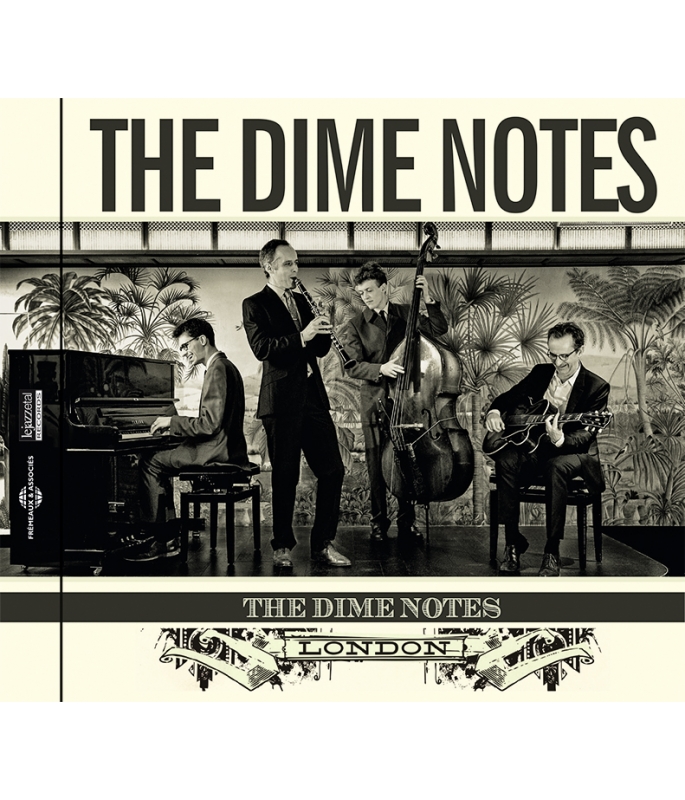
THE DIME NOTES, LONDON
Pendant jazz des groupes de « old time », les Dime Notes se sont donné pour mission d’excaver le répertoire du début du jazz, principalement issu de la période pré-swing des années 1920 et de le faire rencontrer au grand public. Ils rendent notamment hommage aux premières figures tutélaires de la Nouvelle Orléans comme Jelly Roll Morton ou Sidney Bechet. Hipsters parmi les hipsters (premier groupe de jazz trad à avoir une barre de chocolat bio à son effigie), ils offrent un jazz vintage avec une élégance toute britannique. À l’heure où Londres devient la nouvelle capitale bouillonnante du jazz, les Dime Notes montrent que le patrimoine n’est pas en reste dans ce beau moment d’effervescence.
Augustin BONDOUX / Patrick FRÉMEAUX
DIRECTION ARTISTIQUE : DAVE KELBIE POUR LE JAZZETAL
DIRECTEUR DE COLLECTION : PATRICK FREMEAUX & AUGUSTIN BONDOUX
DROITS : FREMEAUX & ASSOCIES SOUS LICENCE LEJAZZETAL
COMMERCIALISATION : FREMEAUX & ASSOCIES.
Amongst vintage jazz bands, The Dime Notes have given themselves the mission of unearthing early pre-swing jazz tunes, dusting them down, reinventing them, and taking them to a wide audience. In so doing they pay tribute to the vanguard of New Orleans jazz, Jelly Roll Morton, Sidney Bechet, King Oliver, and the list goes on. The hippest of the hip, they are the ¬ first vintage jazz band with an eponymous organic chocolate bar and they deliver vintage jazz in typically elegant, British style. As London becomes the ebullient new jazz capital, the Dime Notes show that the history of the music is still relevant in all the excitement. Augustin BONDOUX / Patrick FRÉMEAUX
ORIGINAL JELLY ROLL BLUES • ALABAMY BOUND • AUNT HAGAR’S CHILDREN’S BLUES • BLACK STICK BLUES • THE PEARLS • T’AIN’T CLEAN • OTIS STOMP • SI TU VOIS MA MÈRE • THE CAMEL WALK • THE CRAVE • I BELIEVE IN MIRACLES • TURTLE TWIST • WHAT A DREAM.
ANDREW OLIVER PIANO
DAVID HORNIBLOW CLARINET
DAVE KELBIE GUITAR
TOM WHEATLEY DOUBLE BASS
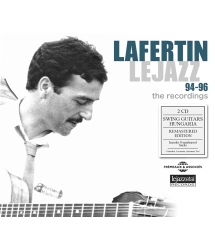
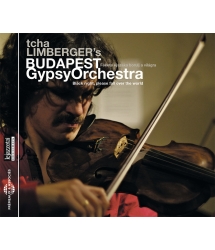
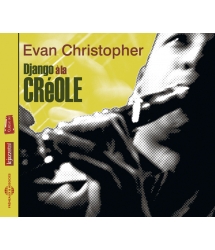
-
PisteTitreArtiste principalAuteurDuréeEnregistré en
-
1Original Jelly Roll BluesDave Kelbie, Andrew Oliver, David Horniblow, Tom WheatleyJelly Roll Morton00:03:552016
-
2Alabamy BoundDave Kelbie, Andrew Oliver, David Horniblow, Tom WheatleyDe Silva00:04:032016
-
3Aunt Hagar's Children's BluesDave Kelbie, Andrew Oliver, David Horniblow, Tom WheatleyW.C. Handy00:04:362016
-
4Black Stick BluesDave Kelbie, Andrew Oliver, David Horniblow, Tom WheatleySidney Bechet00:05:042016
-
5The PearlsDave Kelbie, Andrew Oliver, David Horniblow, Tom WheatleyJelly Roll Morton00:05:192016
-
6Ain'T CleanDave Kelbie, Andrew Oliver, David Horniblow, Tom WheatleyB. Senter00:03:332016
-
7Otis StompDave Kelbie, Andrew Oliver, David Horniblow, Tom WheatleyAndrew Oliver00:04:162016
-
8Si tu vois ma mèreDave Kelbie, Andrew Oliver, David Horniblow, Tom WheatleySidney Bechet00:06:172016
-
9The Camel WalkDave Kelbie, Andrew Oliver, David Horniblow, Tom WheatleyBrymm00:02:582016
-
10The CraveDave Kelbie, Andrew Oliver, David Horniblow, Tom WheatleyJelly Roll Morton00:04:582016
-
11I Believe In MiraclesDave Kelbie, Andrew Oliver, David Horniblow, Tom WheatleyLewis00:03:382016
-
12Ole MissDave Kelbie, Andrew Oliver, David Horniblow, Tom WheatleyW.C. Handy00:03:152016
-
13Turtle TwistDave Kelbie, Andrew Oliver, David Horniblow, Tom WheatleyJelly Roll Morton00:02:522016
-
14What A DreamDave Kelbie, Andrew Oliver, David Horniblow, Tom WheatleySidney Bechet00:02:512016
FA8553 The Dime notes
THE DIME NOTES
THE
DIME
NOTES
In the last fifty-plus years, since Chris Barber and Ken Colyer, some might say that
traditional jazz in the UK has come a long way. Others might argue that it’s simply come full circle. Either way, here we are in 2016, nearly a century since the first recordings of music marketed as ’jazz’, with a recent revival of music anchored in pre-war jazz styles. Among the current generation’s enthusiastic practitioners, who can be heard all over the world, are the four UK based musicians herein whose group, The Dime Notes, specialises in early jazz, stomps and swing. Owing to a kinship of musical interests, marked professionalism and a confluence of other circumstances, they have already achieved a true ‘band’ sound with a maturity that is quickly distinguishing them from the pack.
Their presentations have the cool, casual flow associated more with New Orleans than their rough-edged British predecessors who often belied the sophistication and intricacies of this music. But whereas many groups on today’s scene are likely unaware of the debt they owe to veteran bandleaders such as Chris Barber, Humphrey Lyttleton or Alex Welsh (I suspect some musicians who got into this music because it seemed fashionable had never heard of Humph until he collaborated with Radiohead), the Dime Notes have direct connections to the earlier UK tradition. About the same time that Andrew Oliver arrived from his native Oregon, reedman David Horniblow returned to London having finished a tenure in the Barber band. Bassist Tom Wheatley’s father is Martin Wheatley, a talented guitarist of note specialising in 1920s and 30s stylings. And collaborations with other longtime devotees of swing such as trumpet-man Enrico Tomasso have reduced the degrees of separation between the Dime Notes and many great musicians before them, even Louis Armstrong.
The longevity of the better early UK ‘Trad’ bands is testimony to their broad repertoire, stylistic flexibility and musicianship, all qualities the Dime Notes share. But another
significant aspect shared by both revivals is the acceptance of traditional jazz as music for dancing as well as listening. The Dime Notes appreciate that rarities like The Camel Walk work equally well for the current crop of Lindy Hoppers and swing dancers as they do for concert-goers who, from a seated position, delight in the band’s propulsive, driving energy and the way in which skilled performers like these can bring history alive. Indeed, the Dime Notes are a band becoming just as popular with the bearded veteran jazz record collector set as the bearded hipsters attracted to the genre’s vintage dimension. They’re also just as much at home in the East London bars, restaurants and funky clubs that have proliferated over the last decade as they are in concert venues and cultural centers who boast progressive, diverse programming.
On this note, though one might wish that the surviving historic jazz clubs evolved their organisations to attract new listeners, the Dime Notes are among a generation of DIY bands that utilise a newer model. Mobility and effective use of social media platforms enable them to build an audience less dependent on geography or knowledge of the music. This ‘world music’ aesthetic, encouraged by their rhythm guitarist, Dave Kelbie, who brings years of involvement with European Gypsy music, allows them to embrace the diversity of less traditional venues. Even more significantly, it builds a more inclusive community, based not upon nostalgia or cliché notions of authenticity, but around the experiences the music can provide.
It’s surely quite liberating to be unconcerned with distinctions of ‘revivalists’ vs ‘traditionalists’. Whereas post-war interest in African-American culture including the traditional music of New Orleans had social and political underpinnings, the current allure reflects this more globalist perspective. Musicians today generally feel free to explore their leanings without justifying or defending their breadth of influences. Take for example, Andrew Oliver, the band’s leader and pianist who is the quintessential musician’s musician. His dedication to commanding many styles and genres of music nearly to the point of obsession has suited him well in his career thus far, especially for this project that mirrors the philosophy of the colorful Jelly Roll Morton, who first sparked Oliver’s interest in jazz.
Morton figures prominently in the band’s aesthetic, and much of the Dime Notes’ attention to his material focuses on his compositional approach, especially his solo
conceptions that are orchestrations unto themselves. Though Morton’s claim that he invented jazz is arguable, his assertions that the music’s origins had requisite components of all ‘finest class musics’ from blues to opera, rhythms both hot and sweet and what he called ‘Spanish Tinge’, are undeniable. In this spirit, one hears in Oliver’s virtuosity his classical training, jazz studies including university in New Orleans, and influences of diverse world musics such as Mandinka traditions of West Africa and Argentine Tango.
Several selections recorded here demonstrate the band’s predilection for the multi-strain works by Morton and others. They allow a move away from soloing on a single theme, in favor of following the narrative arcs created by contrasting sections and grooves. For example Morton’s Original Jelly Roll Blues, often just Jelly Roll Blues and The Pearls, expansions of Morton’s 1938 solo demonstrations rather than reductions of his band recordings, retain their compositional integrity up to the respective ‘trio’ sections. But after the statement of these third strains, salient compositional elements give way to personal interpretation. In Jelly
Roll
Blues in particular, the habañera, found in the indigenous musics of New Orleans from Morton’s time to the present, comes like a welcome upshift of gears leading into a stompy out-chorus that sits back with a New Orleans swagger instead of the forward-leaning momentum more typical of ‘British Trad’.
These varied rhythmic feels are welcome in a musical genre that often suffers from a sense of sameness. Andrew Oliver’s study of Morton as well as Argentine tangos and milongas make the Dime Notes’ interpretations of works like The Crave almost more ‘Spanish-tinged’ than Morton himself. David Horniblow’s supple phrasing that evokes the Creole clarinetists he admires, floats over these rhythms well, and the drummer-less rhythm section encourages space, subtlety and transparency that can be lacking in larger ensembles. Besides, old-time ‘musicianers’ always preached the idea that, in New Orleans music, everyone has to be the drummer. One senses that these musicians know this well and drums are not missed in the least. This is especially so in the driving four-feel created by Kelbie and Wheatley reminiscent of the swing of Ray Brown and Herb Ellis with Oscar Peterson or the two-feel that stomps like Johnny Dodds in his Southside Chicago days.
Like the better pioneering bands of the trad boom in the UK, the Dime Notes favor tunes less commonly performed. But by retaining vamps, verses and other ‘lost’ parts of the older popular songs, the vehicles retain a density that prevents them from feeling watered down. Standards like Alabamy Bound, for example, which gives a nod to Fletcher Henderson’s version here, stay fresh, while the rarity of novelty numbers like ‘Tain’t Clean or The Camel Walk allow the band to focus on melody and groove without concern of listener pre-conceptions.
A straight-forward rendering of Morton’s Turtle Twist reveals that they have done their homework well, but make no mistake, the Dime Notes are not a repertory band. They are also not gratuitously or carelessly mixing genres and trying to create a wild hybrid, despite their collective experience in other musical styles. Instead, while responsibly working with the style-specific vocabularies of their individual instruments, their explorations try to imagine an organic progression for these traditions. A good example is Tom Wheatley’s conversational slap bass solo on Aunt Hagar’s Blues. “Pops” Foster, Steve Brown or Chester Zardis revolutionised the instrument even more than they defined a style and Wheatley reminds us that the spirit of the early jazz pioneers was actually quite modern, even avant garde.
David Horniblow’s attention to Sidney Bechet, who is well represented by the album’s ballad, Si Tu Vois Ma Mère as well as the swinging What a Dream and Black Stick Blues is another example of how genuine interest and love for the style is clear without being derivative or unimaginative. Other influences directly informing his clarinet style, rich with the ‘hot’ rhythmic energy of the 1920s, include Barney Bigard, Johnny Dodds and Jimmie Noone. However, although the quartet features a single lead voice, Oliver often evokes stylists such as Earl Hines to add dazzling interplay against the clarinet. This provides a fullness to the texture and captures the collective spirit music-making integral to New Orleans music.
It is important to mention the sonic quality of this debut recording, which is congruous with the band’s standards. Just as the Dime Notes strive to exude a contemporary, not nostalgic character, so does the recording. Dave Kelbie’s LeJazzetal label, internationally recognised for promoting the highest quality jazz and European Gypsy music, favors the boldness of live acoustic recording, yet with the highest technical standards possible.
One Andrew Oliver original, Otis
Stomp, inspired by a small Oregon town called Otis Junction made it into the mix as well. It starts as a thank you to their heroes like Morton before steaming ahead into a solo section that is progressive without being
anachronistic. Maybe it’s a harbinger of things to come for the band, occasionally billed as “London’s most stylish vintage Jazz band.” But for now, this first outing reveals well that the Dime Notes are on their way to raising the bar for presenting early repertoire in a nuanced way.
Recorded and Mixed at Master Chord Studio, London, Engineered by Dougal Lott, Assisted by Michele G. Catri
www.masterchordstudio.com
6th June 2016
Mixed by Dave Kelbie & Andrew Oliver
9th June 2016
Mastered by Minerva Pappi at Waudio, Helsinki
P 2016-2018 lejazzetal records
© 2018 Groupe Frémeaux Colombini sous licence Lejazzetal Records
Original artwork by Dave Kelbie
assisted by Kathryn at Prestset
Manufactured by Frémeaux & Associés
Coordination by Augustin Bondoux
Photos
Frontcover & inside spread - Annabel Moeller
Booklet inside - In page order - Dressing room by Dave Kelbie, David Horniblow by Stephanie Oliver, Andrew Oliver by Aaron Davies,
Tom Wheatley by Nima Hajirasouliha, guitar spread video still, BW spread by Tom Sankey, Dave Kelbie by Alexander Soloviev,
Andrew at the Steinway by Michele Catri,
BW David Horniblow by Tom Sankey,
Andrew Oliver by Tom Sankey
and Inlay Dime Note artwork by
Tiny Little Hammers
Sleeve notes by Evan Christopher
www.clarinetroad.com
Thanks to Mirella Hodzic, Michele Catri,
Dougal Lott, Minerva Pappi, Dylan Fowler, Annabel Moeller, James Huertas,
Evan Christopher, Dylan McConnell
Management: Lejazzetal London UK
Dave Kelbie, Lejazzetal
dave.kelbie@gmail.com
www.thedimenotes.com
www.lejazzetal.com
www.fremeaux.com
Contact :
Lejazzetal Records London UK Frémeaux & Associés
Dave Kelbie Coordination: Augustin Bondoux
dave.kelbie@gmail.com info@fremeaux.com
for CDs, tour dates and more... full catalogue
www.lejazzetal.com www.fremeaux.com
1. Original Jelly Roll Blues 3íí:55
Jelly Roll Morton
2. Alabamy Bound 4:03
Henderson / DeSilva / Green
3. Aunt Hagar’ííís Childrení’s Blues 4:36
W.C. Handy
4. Black Stick Blues 3:04
Sidney Bechet
5. The Pearls 5:19
Jelly Roll Morton
ëë6. T’ain’ít Clean 3:33
ëëBoyd Senter
7. Otis Stomp 4:16
Andrew Oliver
8. Si Tu Vois Ma MËere 6:17
Sidney Bechet
9. The Camel Walk 2:58
Schafer / Mack / Brymm / Smith
10. The Crave 4:58
Jelly Roll Morton
11. I Believe In Miracles 3:38
Lewis / Wendling / Meyer
12. Ole Miss 3:15
W.C. Handy
13. Turtle Twist 2:52
Jelly Roll Morton
14. What A Dream 2:51
Sidney Bechet
all arrangements by the quartet
Pendant jazz des groupes de « old time », les Dime Notes se sont donné pour mission d’excaver le répertoire du début du jazz, principalement issu de la période pré-swing des années 1920 et de le faire rencontrer au grand public. Ils rendent notamment hommage aux premières figures tutélaires de la Nouvelle Orléans comme Jelly Roll Morton ou Sidney Bechet. Hipsters parmi les hipsters (premier groupe de jazz trad à avoir une barre de chocolat bio à son effigie), ils offrent un jazz vintage avec une élégance toute britannique. À l’heure où Londres devient la nouvelle capitale bouillonnante du jazz, les Dime Notes montrent que le patrimoine n’est pas en reste dans ce beau moment d’effervescence. Augustin BONDOUX / Patrick FRÉMEAUX
Amongst vintage jazz bands, The Dime Notes have given themselves the mission of unearthing early pre-swing jazz tunes, dusting them down, reinventing them, and taking them to a wide audience. In so doing they pay tribute to the vanguard of New Orleans jazz, Jelly Roll Morton, Sidney Bechet, King Oliver, and the list goes on. The hippest of the hip, they are the first vintage jazz band with an eponymous organic chocolate bar and they deliver vintage jazz in typically elegant, British style. As London becomes the ebullient new jazz capital, the Dime Notes show that the history of the music is still relevant in all the excitement.
Augustin BONDOUX / Patrick FRÉMEAUX
1 Original Jelly Roll Blues
2 Alabamy Bound
3 Aunt Hagar’ís Children’ís Blues
4 Black Stick Blues
5 The Pearls
ëë6 T’ain’ít Clean
7 Otis Stomp
8 Si Tu Vois Ma MeËre
9 The Camel Walk
10 The Crave
11 I Believe In Miracles
12 Ole Miss
13 Turtle Twist
14 What A Dream
« London’s most stylish vintage Jazz band »
Evan CHRISTOPHER
